

10th Grade Library Skills Worksheets. Race in the 1920s - Digital Notebook - Google Slides. Integrating Brain-Based Learning in the Classroom - Brain Based Learning. A good way to work with these guidelines is to write each concept on an index card and then list some of the specific, practical strategies you can do to make it happen.
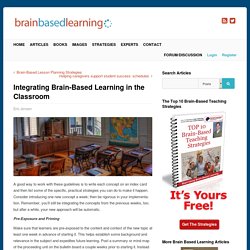
Consider introducing one new concept a week; then be rigorous in your implementation. Remember, you’ll still be integrating the concepts from the previous weeks, too; but after a while, your new approach will be automatic. UAV (Drones) - Inquiry Unit. Background Information Semi-autonomous and autonomous aerial vehicles or UAVs are part of a very long history that is directly connected to the histories of piloted flight, ballistics, and information processing.
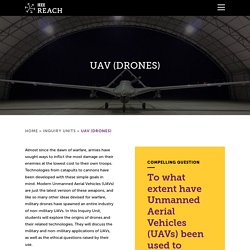
Early progress in UAV research was certainly toward military use, but more recently, the technologies were adapted to civilian and commercial activities, as well as to humanitarian and research programs. Beginning in antiquity, people experimented with a variety of aerial machines, including mechanical wings to allow a person to glide through the air, flying automata driven by compressed air or springs, vertical lift machines such as helicopters, lighter-than-air craft such as hot air balloons, and manned airplanes.
They also engineered catapults of varying types that could hurl projectiles through the air at enemies from a distance, demonstrating their understanding of such physical principles as lift, torsion, mechanical advantage, drag and thrust. Download. Citation & Documentation - Excelsior College OWL. Here you’ll find extensive support for APA, MLA, and Chicago documentation styles.
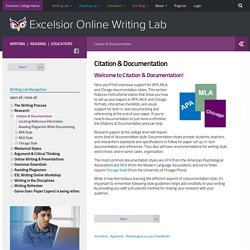
This section features instructional videos that show you how to set up your papers in APA, MLA, and Chicago formats, interactive checklists, and visual support for both in-text documenting and referencing at the end of your paper. If you’re new to documentation or just need a refresher, the Citations & Documentation area can help. Research papers at the college level will require some kind of documentation style. Documentation styles provide students, teachers, and researchers standards and specifications to follow for paper set up, in-text documentation, and references. The case for strategic planning. It’s like making resolutions, but it’s all about measuring your progress toward keeping them.
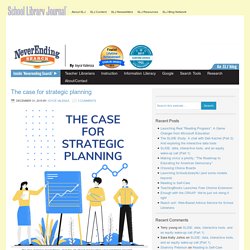
In practice, I regret that didn’t create formal plans. I did write at least three goals each year and I reported on my progress. Those goals moved my program forward and moved me beyond simply making short-sighted hunches that I was simply doing a good job every day. For example: Goals pushed me to address the needs of the growing immigrant population in our community by gathering critical resources and developing targeted learning experiences and activities for our ESL students.
Goodbye, Boring Database Instruction. Hello, Search App Smackdown! Identifying and Locating Scholary Articles. Evaluating Articles. Handouts, Worksheets, & Activities for Information Literacy. Teaching & Learning Department I Services Handouts: Information on key concepts & skills Worksheets: Exercises for students Activities: In-class activities to be facilitated by an instructorAdditional Resources More about information literacy.
The Rise of Junk Science. In early 2017, Eduardo Franco, a professor in the Faculty of Medicine at McGill University, sent an email to his colleagues, warning them of a global “epidemic” of scams by academic journals that was corrupting research and, in effect, endangering the public.
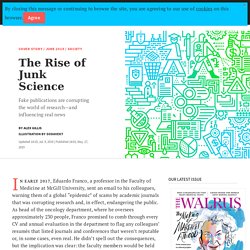
As head of the oncology department, where he oversees approximately 230 people, Franco promised to comb through every CV and annual evaluation in the department to flag any colleagues’ resumés that listed journals and conferences that weren’t reputable or, in some cases, even real. He didn’t spell out the consequences, but the implication was clear: the faculty members would be held accountable. A scholar for forty years, Franco has followed the rise of junk publishers for about a decade.
He has seen them go from anomalous blights on academics’ credentials to widespread additions on scholarly resumés, nearly indistinguishable from legitimate work. Now, he says, “there’s never been a worse time to be a scientist.” So they rebelled. LAMBOOZLED! Using Search Engines- CRLS Research Guide. It's pretty easy.
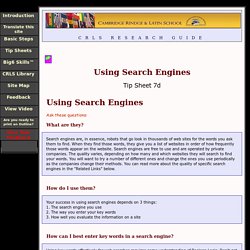
Just follow these basic guidelines and plug in your own key words. For a more developed discussion of this topic with examples and diagrams, click on the "Related Links" below. Is your list of relevant hits too big? To get fewer hits, try one or both of the following: 1. If you are getting too many unwanted hits, limit your search by linking your key words with the phrase AND (some search engines use the plus '+' sign instead). Exploring Students’ Decision-Making Processes in Information Literacy. Creating an Annotated History Bibliography. A Roadmap of Your Interpretation A annotated bibliography for history research shows sourcing, contextualizing and corroborating, the thinking skills used by historians.
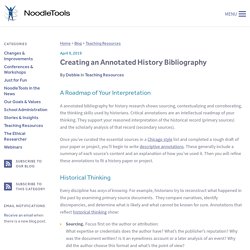
Critical annotations are an intellectual roadmap of your thinking. They support your reasoned interpretation of the historical record (primary sources) and the scholarly analysis of that record (secondary sources). Once you’ve curated the essential sources in a Chicago style list and completed a rough draft of your paper or project, you’ll begin to write descriptive annotations.
These generally include a summary of each source’s content and an explanation of how you’ve used it. Historical Thinking Every discipline has ways of knowing. Sourcing. Helping Students Become Better Online Researchers. Your students are probably Internet authorities.
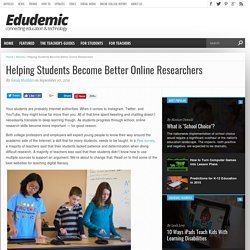
When it comes to Instagram, Twitter, and YouTube, they might know far more than you. All of that time spent tweeting and chatting doesn’t necessarily translate to deep learning though. As students progress through school, online research skills become more important — for good reason. Both college professors and employers will expect young people to know their way around the academic side of the Internet; a skill that for many students, needs to be taught. In a Pew survey, a majority of teachers said that their students lacked patience and determination when doing difficult research. An open access resource for faculty and librarians. Modules Multimedia Aligned with Research Assignment. Credo InfoLit Learning Community. New Credo Resources Final Version of Credo's IL Strategy Handbook Released Credo has released the final version of our IL Strategy Handbook, a free online publication that covers how to plan, implement, and improve an IL program.
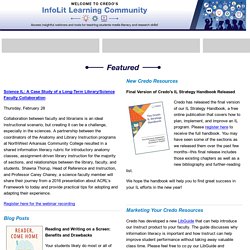
Please register here to receive the full handbook. You may have seen some of the sections as we released them over the past few months--this final release includes those existing chapters as well as a new bibliography and further-reading list. We hope the handbook will help you to find great success in your IL efforts in the new year! Creating Good Research Questions - English: Intro to College Writing - Research Guides at Madison College (Madison Area Technical College)
Creating research questions is an important step in the research process that many students would rather skip.
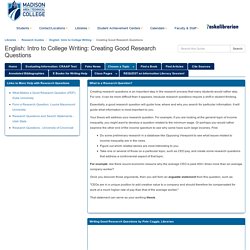
For one, it can be more difficult than it appears, because research questions require a shift in student thinking. #7 Avoiding Researcher Bias - Think Like a Researcher: Instruction Resources - LibGuides at University of California Merced. Lesson Pre-questions Video: Researcher Mike Rugg Talks About His Bigfoot Sightings Post-questions 1) Pre-video discussion questions: Do you believe that Bigfoot really exists? Why or why not? Have any of you done serious research on the subject of Bigfoot, Sasquatch, yetis, etc.? Consider these questions as we watch a video narrated by researcher Mike Rugg. Ten Search Strategies Students Should Try. Students often think that because they can type a phrase into Google or saying something aloud to Siri they know how to search.
Of course, any teacher who has heard a student say "Google has nothing on this" or "there's no information about my topic" knows that students don't inherently know how to search despite growing up in a world filled with Google and Siri. When your students need help formulating or refining a search, have them review the following ten tip. Better yet, have them review these tips before starting their next searches. Ten Search Strategies Students Should Try 1. Research Questions WS handout. Lesson Plan Ideas For Teaching Information Literacy.
Fake news has been around since the founding of our country, as seen in Ron Chernow’s Alexander Hamilton. In a recent conversation with seventh graders, I asked the students how many of them in the past few days had read a news article on one of their social media sites. Almost every hand went up. As a high school librarian, who also teaches a seventh-grade computer literacy class, I have a unique perspective through which to observe the ways teens and pre-teens retrieve and process information.
Although almost all of them have heard the term “fake news” and are aware that misinformation circulates online, few of them actively engage in critically analyzing the continual bits of information they receive throughout each day. Information Skills Lesson Plans. Resources for School Librarians - Index Menu for This Page: General Collections of Lesson Plans | The Dewey Decimal System | Reference Books and Web Sites | Worksheets | Research Methods and Reports | Miscellaneous and Holiday Lessons General Collections of Lesson Plans.
Writingcenter.unc. Planning to use that Info? – Presentation by debschi. 300+ Web Searches for Your Online Literacy Class. Developing a Research Question. Evaluating the Interwebz with Designated Skeptics. Short Description: This is a short, engaging activity suitable for learners of all levels. In it, students evaluate web sources that are provided by an instructor using the acronym CRAAP (currency, relevance, accuracy, authority, and purpose).
Students work together in groups and explore evaluation processes aloud, with guidance from the CRAAP cards and the instructor. Information Evaluation Learning Experiences. Start - Evaluating Information - LibGuides at Gonzaga University. Quick question: how many animals did Moses take onto the ark? (Highlight to see spoiler): None, actually. That was Noah. What country is Theresa May president of? (Highlight to see spoiler): She's not. But she’s the Prime Minister of the United Kingdom. Evaluating Sources for Research. Allard - AHS Subject Guides: English - LibGuides at Amity Regional High School. W. Rocco AP Capstone - AHS Subject Guides: English - LibGuides at Amity Regional High School. S.O.S. for Information Literacy. Bake Up Some Research. All These Articles. Summary. Points of View and Omnifile. Summary. Library Mythbusters. The Game of Research.
Teaching Materials. Evaluating Sources for Research. Google Bucket. NoodleTools : Show Me Information Literacy Modules. Getting started - Teach Yourself - Concordia Library. Library Research Skills Tutorial. Overview - The Literature Review: A Research Journey - Research Guides at Harvard Library. Literature Reviews: An Overview for Graduate Students. Media Literacy Now – Advocating for Media Literacy Education. Mind Over Media. Best Professional Development Websites and PLNs for Teachers. Best Professional Development Websites and PLNs for Teachers. Searching the Deep Web - Bates InfoTips. I recently developed a private workshop on how to find deep web resources on a specialized topic, and realized that the secret to finding information in the deep web is know that it’s a very different experience than searching the open web.
While deep web content isn’t indexed by search engines, you can use search engines to find pointers, leads and links to deep web resources. Even more than with most “traditional” searches, looking for deep web content means thinking like a detective — looking for clues, using your peripheral vision to notice references or footnotes, and knowing when to step back and reassess.
Following are some of the key approaches I recommend for finding deep web content on a particular topic. 4 Note Taking Systems To Consider. An open access resource for faculty and librarians. TRAILS-InformationLiteracy - Lesson Plans. IL for Trails9 - Lesson Plans from Previous Wiki. Some of The Best Academic Search Engines for Teachers and Student Researchers. Critical Thinking Tips - Evaluating Sources - Library Resources Home at Fox Valley Technical College. Web Literacy - Mozilla Learning. News Literacy - High School. Curation and the School Librarian. Community of Online Research Assignments. S.O.S. for Information Literacy. News & Media Literacy. Search Strategies. Library Media Tech Talk: The Crucible Collaboration.
Library Media Tech Talk: The Dust Bowl Collaboration Blows In Again! Lessons Worth Sharing. ReadWriteThink - Classroom Resources. Media Smarts Lessons & Resources. ReadWriteThink. Read, Write, Think - Lesson Plans. ReadWriteThink - Explore Thinkfinity.org. Microsoft Education. Digital textbooks and standards-aligned educational resources.
Gateway to 21st Century Skills. Information Literacy Lesson Plans – Educator's Reference Desk. AASL Lesson Plans - Grades 9-12. ALA Web Sites with Lesson Plans for Teachers. ALA - ACRL releases The Discovery Tool Cookbook: Recipes for Successful Lesson Plans. AASL Action Example Template - Learning4Life. AASL Lesson Plan Rubric. Teacher's Guide to Digital Citizenship. Lessons Plans – Educator's Reference Desk. About Google app.